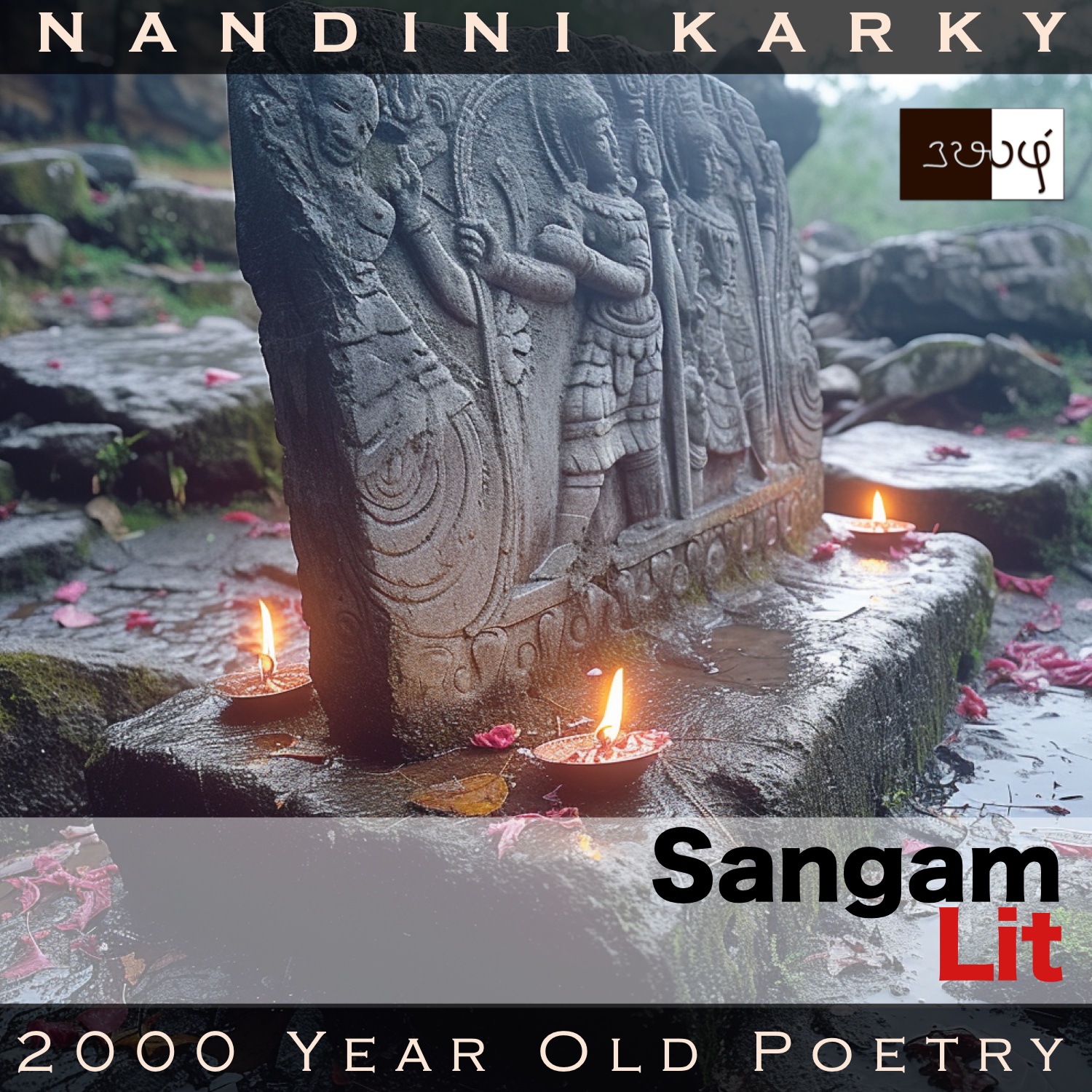Podcast: Play in new window | Download
Subscribe: Apple Podcasts | Spotify | Amazon Music | Android | iHeartRadio | TuneIn | RSS | More
In this episode, we perceive the virtues of a town, as depicted in Sangam Literary work, Puranaanooru 329, penned by the poet Madurai Aruvai Vaanikan Ilavettanaar. Set in the category of ‘Vaagai Thinai’ or ‘Victory’, the verse informs us about ancestor worship in Sangam times.

இல் அடு கள்ளின் சில் குடிச் சீறூர்ப்
புடை நடு கல்லின் நாட் பலி ஊட்டி,
நல் நீராட்டி, நெய்ந் நறைக் கொளீஇய,
மங்குல் மாப் புகை மறுகுடன் கமழும்,
அரு முனை இருக்கைத்துஆயினும், வரி மிடற்று
அரவு உறை புற்றத்து அற்றே நாளும்
புரவலர் புன்கண் நோக்காது, இரவலர்க்கு
அருகாது ஈயும் வண்மை,
உரைசால் நெடுந்தகை ஓம்பும் ஊரே.
A crisp song that describes the town of a great leader. The poet’s words can be translated as follows:
“’Twas but a small town where toddy was brewed at home. Nearby, stood memorial stones, which were offered sacrifices every day, washed with pure water, and adorned with lamps filled with ghee. The fragrance of the dark and cloudy smoke from these lamps spread to the streets. Even though it’s such an alluring place, as if it were instead, a mound where a snake with a striped throat lives, it appeared to the worried eyes of his enemies. Not caring about this trouble he was causing to enemy kings, rendering ceaselessly to supplicants, lives the great and famous leader, the protector of this town!”
Let’s delve into the details. The poet starts by mentioning that a particular town was rather small in spread and population and to symbolise this facet he makes the statement that the toddy needed by the people were brewed at homes. A moment to pause and consider what this means! Could this mean that if the town was larger and had more people visiting it, there would be a centralised place where toddy was produced in greater quantities? Perhaps the difference between procuring vegetables from a home garden and a market, to give another example! Wish archaeologists unearth more settlements from the Sangam period which reveals a clear layout of their urban planning. Returning to the verse, we now see the poet pointing to a memorial stone, which is a monument raised after the death of a leader, who was renowned for his heroic actions. In newspapers in Tamilnadu, the appearance of articles about the discovery of these hero stones is quite frequent.
The memorial stones in this town are worshipped in a specific way, says the poet, describing how sacrifices are offered every day without fail. Whether it was food cooked at home or offerings of animals, this verse does not say. The other activities of worship are washing the memorial stones with water, and lighting ghee lamps before the same, both of which are done till this day not on memorial stones of mortal heroes but on the stone idols of gods and goddesses in Hindu temples.
Reverting back to those ghee lamps, the poet mentions how the fragrance of the dark smoke that rises from them spreads to the streets of the town. He now turns to us and says, with all these elements, you might think this is a town that everyone would love to visit, an idyllic place. However, to certain people, it appeared like a mound holding a dangerous snake within. And, who are these people? The enemies of this town’s leader, it appears! He was so courageous and valorous that he caused anxiety in those who wanted to oppose him. But not worrying about the terror he evokes in enemy kings, the famous leader went on to give ceaselessly to the supplicants who came to his door, the poet concludes. And thus in a few lines, we get to learn so many facts and facets from the past, in this song that yet again intends to speak about a leader’s courage and compassion.




Share your thoughts...